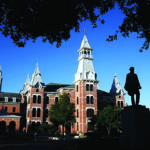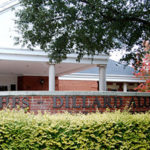WACO—Baylor University graduates who want to reach their alumni association no longer can do it through the school’s phone system, e-mail or website.
The university recently notified the Baylor Alumni Association it would be removed from the school’s toll-free phone line and the alumni association staff would lose their “baylor.edu” e-mail addresses.
The alumni association also lost its website address and—without advance notice—its link on the “Alumni and Friends” page on Baylor University’s website, www.baylor.edu .
The Baylor Alumni Association’s new toll-free phone number is (888) 710-1859, and its new website address is www.bayloralumniassociation.com.
|
David Garland
|
“The timing of these developments came as a surprise … as only a year ago the university specifically requested that (the alumni association) continue to use these same communication services in the best interests of both the university and alumni,” according to a statement issued by the Baylor Alumni Association.
However, Baylor University officials insist the Baylor Alumni Association has chosen operational independence, and the actions regarding the phone system, e-mail and website are simply the latest steps in an ongoing process begun a couple of years ago.
“We’ve been dealing with this over a long period of time,” Baylor Interim President David Garland said.
The lack of a link from Baylor University’s website to its alumni association makes the university unique among Big 12 Conference schools. Like Baylor, several of those schools have alumni associations that are independent, rather than being departments or offices within a university.
However, those are public universities with independent alumni associations that serve their institutions by lobbying on their behalf for public funds—an activity state universities legally cannot do themselves, noted John Barry, Baylor University’s vice president for marketing and communication. And some of those independent associations have a reporting relationship to the university president or other high-ranking administrator, he added.
Sign up for our weekly edition and get all our headlines in your inbox on Thursdays
Only a small minority—about 13 percent—of the alumni associations in the country are independent, virtually all of them are related to public rather than private universities and their numbers are declining, Barry noted.
“What cannot be debated is that the Baylor Alumni Association’s relationship to Baylor University is a one-of-a-kind situation,” he said.
“It is the nature of the independence that has been sought by the Baylor Alumni Association that is distinct in higher education—not the fact that they maintain separate legal status, even though the number of institutions that are legally separate from their host universities is diminishing.”
Jeff Kilgore, executive vice president and CEO of the alumni association, disagreed—at least up to a point.
“It is very typical for alumni associations to serve in a role as an independent voice of alumni. It’s simply a critical and common piece of good shared governance,” Kilgore said. “Most all self-governed alumni associations … have editorially independent roles, voice differences of opinion from the administration at times, but continue to share Web links and other mutually agreed-upon service relationships that are in the best interest of both parties. The purpose of these roles differs depending on the nature and history of the school.
 “Actually, we do celebrate the (Baylor Alumni Association’s) distinctive purpose among its private school counterparts, which is ‘to maintain and enhance a sound and ongoing equilibrium in the life of Baylor University,’ particularly in regards to helping ensure Baylor’s own distinctive role in higher education—Pro Ecclesia/Pro Texana. I think Texas Baptists and Baylor alumni especially understand this role well.
“Actually, we do celebrate the (Baylor Alumni Association’s) distinctive purpose among its private school counterparts, which is ‘to maintain and enhance a sound and ongoing equilibrium in the life of Baylor University,’ particularly in regards to helping ensure Baylor’s own distinctive role in higher education—Pro Ecclesia/Pro Texana. I think Texas Baptists and Baylor alumni especially understand this role well.
“Most all other private schools with denominational or faith-based roots have forgone their Christian identity in pursuit of academic excellence such as Harvard, Yale and others. Of course, some private schools were simply chartered to be Bible colleges, so those would not have a need for that role, either. An independent voice of alumni has certainly served Baylor well in the past and is intended to be there to ensure in the future her delicate balance of learning and faith.”
The Council for Advancement and Support of Education ethical and operational standards stipulate alumni relations professions have an obligation to “advance the mission of their institutions and serve and support its alumni in an ethically and socially responsible manner,” Barry noted.
According to national standards, alumni associations exist to support the mission of their institutions and their strategic plans, Garland insisted.
“They don’t establish university priorities; they seek to understand them and then to support them,” he said.
The Baylor Alumni Association has savored its independence but also has claimed entitlement to the benefits of connection to the university, Barry said.
“They can’t have it both ways,” he insisted.
The alumni association, on the other hand, insisted it wants operational and editorial independence—not separation in terms of distance from the university.
“It is vital that we are able to maintain close touch with both our new members and the longstanding members whom we serve,” Kilgore said.
“Web links and other types of service arrangements are commonplace be-tween universities and their alumni associations, regardless of such associations’ independent status. That’s simply because such arrangements make good sense, since they serve the best interests of both organizations. My alumni affairs colleagues have verified this and recognize the potential customer-service issues and negative effect on donor relations that these recent developments could have on both the university and (the alumni association).”
Both the university and the alumni association reported successful years financially—even in a depressed economy.
The alumni association completed “a record-setting year in terms of membership and fundraising” and achieved a balanced operating budget for the fiscal year ending May 31—the first year the association did not receive funds from Baylor for contracted services, said David Lacy, president of the alumni association.
In a year when many universities experienced decreased contributions from donors, overall giving to Baylor University was up 3 percent and giving by alumni was up 36 percent, Garland noted.
Baylor Alumni Association and Baylor University began to move toward a mutually agreed-upon degree of separation in the late 1980s, as the university incrementally decreased its funding for the association, Kilgore noted.
Agreements in 1993 and 1994 granted Baylor Alumni Association a “perpetual and fully paid-up license” for the association’s name, recognized the association as the university’s official alumni organization and granted it office space on campus.
Tension between the alumni association and the university developed about six years ago, when Baylor developed its own alumni services office and began publishing its own magazine mailed to alumni and donors.
In 2004, the university’s president and the alumni association signed a services agreement that outlined services the Baylor Alumni Association would perform for the university and the fees Baylor would pay for those services.
When the alumni association hired a firm to survey its members about alumni perceptions of the association and the university three years later, Baylor questioned its legal right to do so under its license agreement, Kilgore said.
Subsequently, Baylor raised concerns about other matters of compliance. In an effort to comply, the alumni association started the process of setting up employee insurance, benefits, retirement and payroll processes separate from the university.
However, Kilgore insisted, the university specifically requested the alumni association continue using Baylor’s toll-free phone line and e-mail system as a mutually beneficial service.
In January, after the alumni association retained a national firm to survey its members about what professional experience and personal qualities alumni want in Baylor’s next president, university officials objected.
That led to a May 26 meeting involving the Baylor Alumni Association executive staff, Baylor’s general counsel and the university president’s chief of staff. At that meeting, Kilgore reported, Baylor’s general counsel presented the alumni association a cover letter and 22 pages of attached material, along with the instruction to “cease and desist all activity that is not within the scope of the license agreement.”
Cited activities characterized as “unlicensed use of the Baylor mark” included the use of the university’s website address, its e-mail addresses for alumni association staff and access to Baylor’s toll-free phone service. The alumni association was given 72 hours to respond, Kilgore reported.
The alumni association “has always been independent and has always served as an independent voice for alumni but, until six or seven years ago, how the relationship was defined has been mutually discussed,” Kilgore asserted.
“What that separation looked like was discussed and agreed upon in how it served the best interests of everyone. In recent years, the university has become increasingly stricter in defining that separation on its own, requiring that the (Baylor Alumni Association) become more and more separated.”
Finding a way to do “what’s best for both parties seems to no longer be a concern of those driving these recent decisions,” Kilgore added.
“There is much opinion that these decisions are being driven by some regents, but no one has yet taken credit. I have received an apology from the administration for not informing us that the Web link was going to be removed, but no one has been able to state whose decision this was,” he said.
Garland and Barry indicated they were not in a position to respond on behalf of the regents. Dary Stone of Dallas, chairman of the Baylor board of regents, was attending a regents’ retreat and could not be reached for comment.














We seek to connect God’s story and God’s people around the world. To learn more about God’s story, click here.
Send comments and feedback to Eric Black, our editor. For comments to be published, please specify “letter to the editor.” Maximum length for publication is 300 words.